Spain: Capping the price of basic foodstuffs?
The proposal made by Vice-President Yolanda Díaz has been flatly rejected by the Minister of Agriculture. From a legal point of view, "it is not possible" and furthermore "it is not desirable either”. New clash between socialist and communist ministers over a proposal to set maximum prices for certain food items in supermarkets.
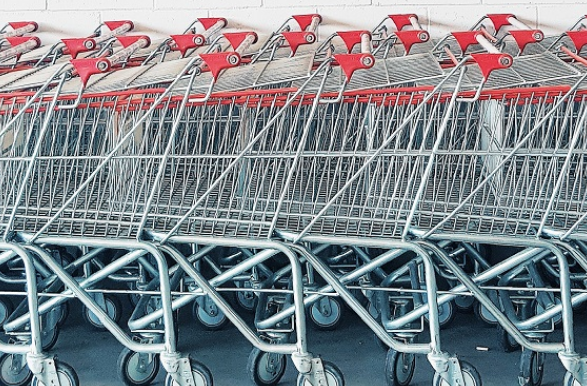
After the reactions of the socialist Minister of Agriculture and the Minister of Finance as well, together with the supermarket associations and farmers' organizations, the communist Vice-President and Minister of Labor has rectified. Ms. Díaz guaranteed that "I have never spoken of a price intervention but of an agreement between the retail sector and consumer associations for something legal that have already was successfully implemented in France in 2011".
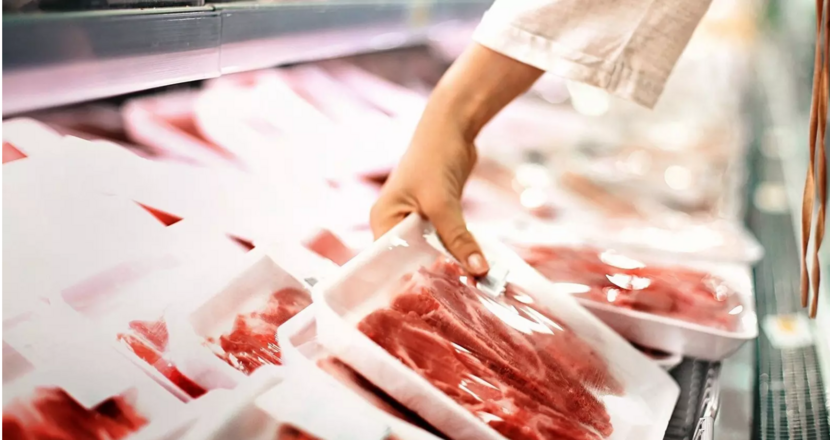
Meetings without inviting the Agriculture minister
Yesterday Vice-President Díaz hold, together with Alberto Garzón, Minister of Consumer Affairs, a meeting with Carrefour to address the issue. However, the evening before, the French company had anticipated by launching a shopping basket with 30 basic items at the price of 30 euros. Carrefour had already launched in France an similar action to fix the prices of some basic items for 100 days.
The ministers’ proposal to limit the shopping basket price is to offer "a varied assortment of fresh products, rotating every week". They advocate that this “frozen price” should remain in place until after Christmas and it should be carried out "sacrificing the commercial margins of the supermarket chains". At the same time, they say that they will ensure that "the capping is not carried out at the expense of farmers". Specialised shops will be left out of the agreement.
The spokesman of Díaz's political party has declared that it will be a complex task to reach an agreement with the big companies to reduce their profits. For this it will be the government who has to make decisions, referring to "creating an windfall tax on large distribution and food companies".
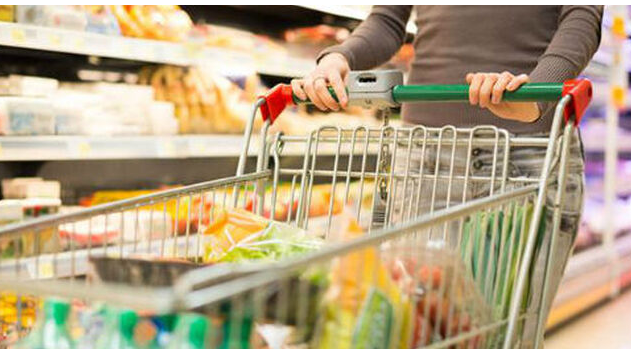
Next Monday, the Vice-President and the Minister of Consumer Affairs will meet with the retail sector organizations and consumer associations to convey the proposal. None of the farmers' associations or the food industry has been invited to this meeting, nor has the Ministry of Agriculture, Fisheries and Food.
What do the supermarkets say?
According to the first reaction of the sectoral organization AECOC, "we don’t need more taxes that increase the companies’ costs and reduce the competitiveness of the sector".
The retail companies are puzzled by the proposal, because the reasons of the high inflation (Spain has reached 10.4% in August) are clearly identified and are not related to the companies increasing their profits. AECOC recalls that the rise in food prices has its origin in the increase in energy prices, "which is the problem that needs to be solved". Production costs for electricity and gas have risen by 300-400% since the beginning of 2021. Apart from that, retail margins in Spain are very narrow (2-3%) so companies need to sell a lot of volume to make a profit.
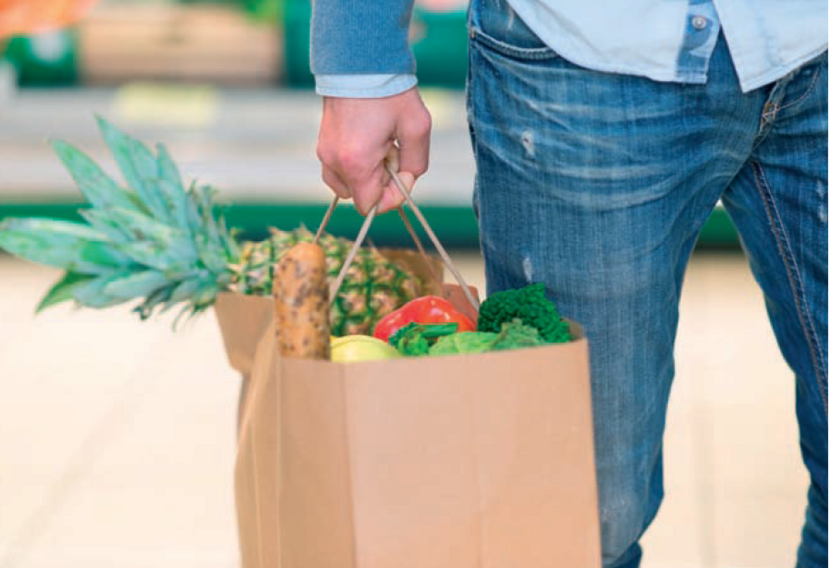
"Spain is one of the European countries where food prices have risen the least due to the moderation that retail is showing and to our distribution model”. "The distribution sector in Spain is less concentrated than in other European countries and has a very varied and local supply," AECOC adds.
What do supermarkets propose?
The retail sector fully agrees with price containment, but by other means such as VAT reductions on basic products (from 10% to 4%) or temporarily removal of the new plastic tax. They say that the reductions in margins that Díaz and Garzón are calling for have already been made for months.
Sources in the sector set the example of milk, one of the products that the communist ministers have asked to cap. "Before, we used to pay 31 euro cents to the livestock farmer and sell it for 60 euro cents. Now we pay 50 euro cents and sell it for around 75 euro cents".
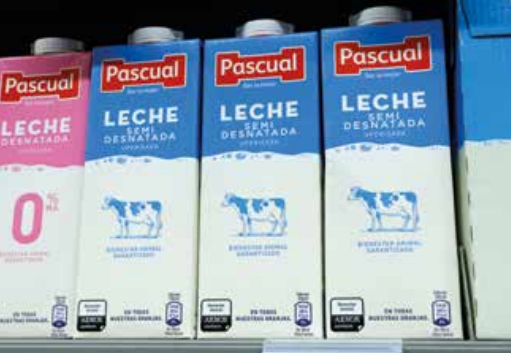
Understanding the retail sector in Spain
Available data (Fig. 1) show why the retail sector doesn’t support the Vice-President’s proposal. The top five supermarket chains in Spain had a market share of 49% at the end of last year. This figure is much lower than that registered in other European countries, such as the Netherlands (80.1%), Germany (79.2%), France (78.9%), Portugal (74.4%), the United Kingdom ( 74.6%) or Italy (58.1%).
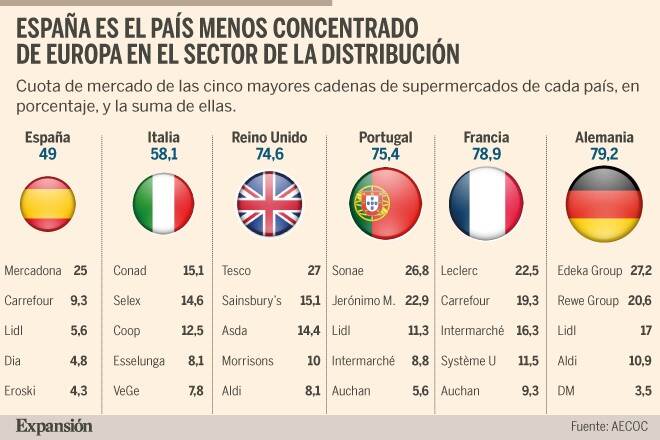
The Spanish market has a clear leader in Mercadona (25% market share), as is the case in Germany (Edeka, 27.2%), the United Kingdom (Tesco, 27%) and Portugal (Sonae, 26.8%). The difference in Spain is the large gap between the leader and the rest of the companies. In Spain, apart from Mercadona, there is no supermarket chain with a share above 10%. There are several reasons for this.
On the one hand, Spanish consumers devote a larger budget to the purchase of fresh food, which results in a greater weight of traditional stores. In addition, the Spanish market is highly unique due to the strong position of regional chains in their respective areas of influence.
The strength of these groups is so significant that one of them is no longer on the list of regional supermarkets. The Valencian cooperative Cosum has expanded so much that it now ranks sixth in the national market in terms of market share, after overtaking Alcampo (Auchan).

The enormous competitiveness of the Spanish market has resulted, for example, in several international giants taking a long time to achieve a relevant position.
Food pricing
The curious thing is that the consumer's search for more competitive prices, due to inflation, is leading to greater market concentration. This, together with rising inflation month by month, would show that consumers are turning to the market leaders in the face of price rises.
The line that consumers are drawing with their shopping habits could result in price caps creating a bigger problem for small groups and traditional shops. They have less flexibility and capacity to reduce margins than large chains, which could set prices below the set limit to be more competitive.
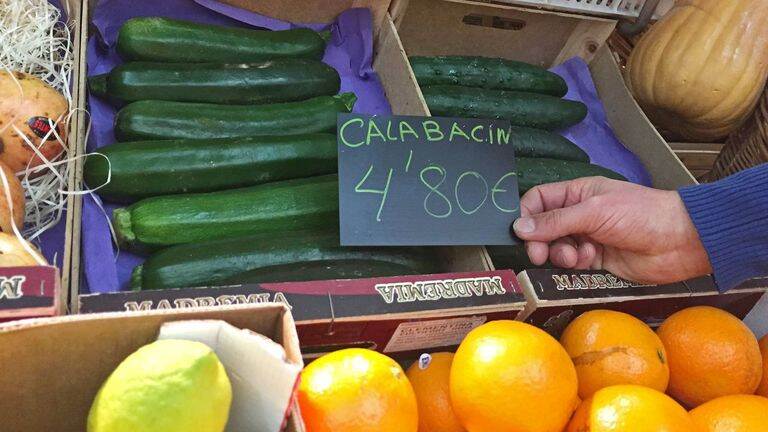
Even, there would be a greater effect on the rest of the food chain, in particular on farmers. The bargaining power of producers vis-à-vis large supermarkets is often very limited, so it is the farmers who have to take the biggest cut in margins.
More on commodity price increase in Spain: Spain: Oils have risen in price by 56%, dairy and eggs by 16% since January 2021 | Nieuwsbericht | Agroberichten Buitenland